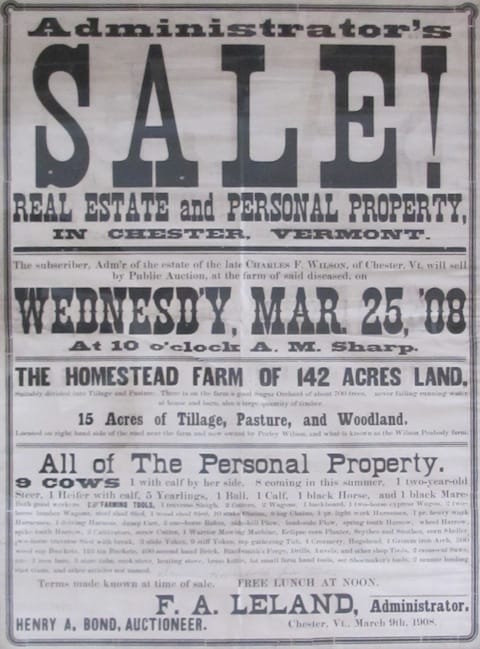
Country auctions as I knew them are now a thing of the past. Vermont was a different place in the 1960s and ’70s. In those days there wasn’t a great demand for antiques. I remember paying $400 for the contents of an eight-room house. I mention this only to help paint a picture of those days.
Sometimes these country auctions were at the end of a dirt road. It was dirt where the wagon wheels and cars had traveled for 150 years. In the center of the road grass grew. This was an inviting scene as you drove to the auction.
It wasn’t uncommon to encounter a farmer driving his herd of cows across the road from the pasture to the barn for milking. Here you sat in your car and waited for the cows to pass. It wasn’t a big deal. We weren’t hurried as today.

As you approach the farm, ram-shackled buildings come into view. Rocky hillside pastures resemble the old world. The house was often an old cape with an ell on one end. Orange daylilies were blooming around the milk house. Off to the side was the cow barn. The auctioneer was set up in front of the ell. Chickens are running about scratching and pecking the ground for pebbles and insects – careful where you step!
Off to the side were the women from the grange. They sold coffee and donuts. Coffee was 25 cents as were homemade donuts. Chocolate chip cookies were 10 cents.
Horse-drawn vehicles were stored in the ell. Up overhead was an attic. To gain access, you climbed a vertical wooden ladder. Hornets and hundreds of protruding roofing nails promised pain. Here generations of chairs, tables, chopping bowls, pantry boxes, and hundreds of other country antiques awaited liberation.
The manure spreader was outdoors in the weather. Pa was talking with neighbors who came to visit. He was wearing his well-worn denim bib overalls and a soiled Beacon Feeds cap. In his bib pocket was a hunk of “Days Work” chewing tobacco. Pa was in his 80s now and a little gimpy so he leaned on his cane for support. Many of this generation of Vermonters were born before 1900. They had a different mindset. It was my pleasure to have met them.
The house was furnished with antiques. The newest thing in the house was an electric refrigerator or a television set with rabbit ears.
Ma always wore a printed cotton dress. Her nylon stockings were rolled down to just below the knee. She wore black shoes with thick heels.
Beginning in the 1960s, the interstate brought newcomers to Vermont. Vermont began to change. These newcomers loved going to country auctions.
Add to this mix my generation who were a product of the ’60s. We were looking for the “alternative lifestyle.” Some of us found it in the antiques business. What a diverse group we were. We could be who we were and people let us be. I miss that the most today.
These old-time country auctioneers were storeowners, farmers, or your insurance agent. You knew you could trust him.
Bus Mars
Bus was in Pawlet, Vt. Bus had an almost square dance type chant, “And a one dollar bid, and a two dollar bid, and a three dollar bid to you… And a four dollar bid, and a five dollar bid, and a six dollar bid back to you.”
The auction
These auctions were a lot of fun. Many people came to enjoy the day and maybe buy a box lot for 50 cents. The auctioneer knew most customers by their first name. I remember one day Harvey bought an antique sword. When it sold, the auctioneer said, “Having trouble at home, Harvey?” Everyone chuckled.
Auctioneers had clever gimmicks to induce bids. A common ploy when trying to sell a potty chair that no one wanted was to say, “It’ll make a great planter.” Or if selling a chamber pot, “Ladies, this is perfect for serving spaghetti.”
Country auctions are a subject that would require many pages to accurately depict. I’ve only scratched the surface here, but hopefully it’ll give you a glimpse of what life was like.
This week’s old saying I have used before but thought it appropriate for this story. It is from a farmer I did business with on a very hot July day. I was complaining about the heat when the old man said, “Corn don’t grow good if the wife can’t sleep naked.”